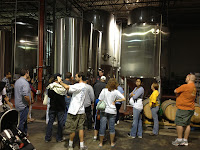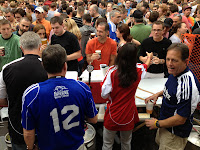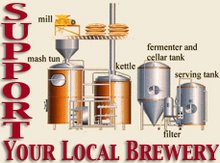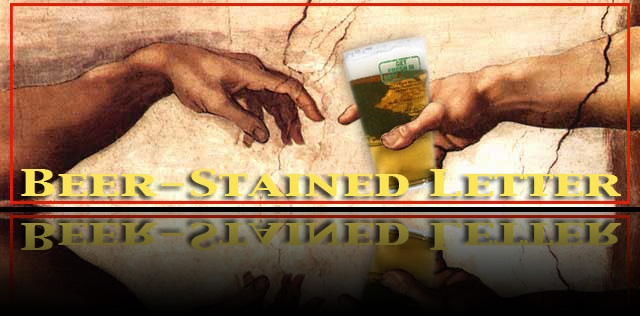The recently enacted law that gives a boost to New Jersey's 25 craft brewers probably helps the dozen-plus brewpubs across the state the most, allowing those breweries to get their names out before the public like never before.
Unlike production brewers that could put their beers in bars and on store shelves, brewpubs in New Jersey had been relegated to selling beer from the place they made it. That restriction limited exposure for the pub breweries' beers and left a drinking public somewhat bewildered at the idea of being unable to get those beers at packaged goods stores. After all, Sly Fox, for example, had a couple of restaurant-breweries in Pennsylvania, yet it's beers were on store shelves.
The new law changes that in New Jersey. Brewpubs, like their production brewer colleagues, can now sign up with beer wholesalers for distribution, giving the pubs a much wider reach than the foot-traffic into their establishments ever allowed.
But imagining that happening is easier to do than making it happen, given the expense of taking on expansion to serve not only the pubs' patrons, but carving out a niche in the crowded and competitive craft beer markets. (Brewpub owners can also own up to 10 locations.)
Still, that idea of a wider reach was fast on the minds of the folks at Harvest Restaurants, which operates nine establishments in upscale areas of Union, Somerset and Morris counties and counts Trap Rock brewpub in that mix.
Harvest is uniquely situated to quickly take advantage of the new regulatory changes and has envisioned putting the beers made at Trap Rock in Berkeley Heights on tap at its other restaurants. It's Hathor Red and Ghost Pony lagers are have been contract-brewed at High Point (Ramstein) for the other Harvest establishments for a while now.
But with a major change in the rules – a change that, in effect, hits the reset button for the state's craft beer industry – it makes sense for a restaurant company that has a brewpub under its ownership to bring things in house.
From that vantage point, Trap Rock brewer Charlie Schroeder took time out from a busy end of the week brew day to discuss such growth and what it would entail.
 BSL:
BSL: Talk about how busy Trap Rock has become. Craft beer has been in New Jersey since 1995, but has really grown hot with the national trend for about four years now.
CS: I'm selling more beer this year than I did last year, and last year was a very big year for me. I finally did over 500 barrels, and I'm beating that this year. Keeping up with demand, even with the new fermenter, isn't easy. I could probably use another fermenter. I'm trying to sell more kegs, but I don't have enough room to store kegs, and I run into the issue of running out of beer, especially the Oktoberfest. This is the first year I'll make three batches of that.
I don't sell a lot of kegs, but it's an important part of the business because people will drink it at their house. (Their guests) will want to know what it is, then they'll be interested and then they'll want to come here and purchase a growler or have a pint here. So it's really about getting the name out there. That's really the only way we can get the beer out there to market, is for customers to buy it and take it home.
BSL: The recently signed craft brewing legislation liberates brewpubs, lets them sell through wholesalers. Because Harvest Restaurants has a number of establishments, the bill signing could conceivably make Trap Rock the supplier of house brands. What's the process of moving forward?
CS: It may mean we find a bigger location or keep the current location and expand possibly next door, or find a bigger building ... I'm not sure yet. We haven't sat down and talked about it because it (the bill signing) just happened a couple weeks ago.
BSL: But this is definitely something that's out there?
CS: There have been conversations (in the past). It's just a matter of sitting down and strategizing, figuring out what's going to work. This legislation is something I have been waiting for for the last five years. The owner has always wanted to do something. Back in 2000, 2001, that's when we first started contract-brewing the Ghost Pony and the Hathor Red at Ramstein.
What we want to be able to do is have my India pale ale on draft, a wheat beer, a dark beer, Belgian beers, and put them in bottles, too. That is something they want to do, and this gives us that opportunity now to do that.
BSL: With some necessary changes.
CS: Now there's a need to expand. Before, when you're just selling within your own walls here, there's no way can expand because you're just selling to who comes in through the door. And you're hoping that you're getting more and more people each year, then you run out of room in the brewery to make more beer.
BSL: In terms of branding, it's important to be able to bring all of the beers here to the other Harvest restaurant locations?
CS: Absolutely. (Patrons) ask all the time 'Why can't I get the beers you make here at those locations?'
BSL: So in effect, the law change and letting you work with a wholesaler could make Trap Rock a focal point of Harvest Restaurants identity.
CS: Oh yeah. It ties it all together.
BSL: So what kind of timeframe are we looking at, in the best-case scenario, of being able to site something and everything comes in at reasonable expense for brewing equipment?
CS: I think it's going to take six months to a year to really get it where it needs to be. I don't think it's going to happen any sooner than that. There are other restaurant projects (the owners) are working on; I don't know where I fit into that. They could decide they want to do it now, and it could be three months, or they need to wait to get certain locations lined up, and then we would do it.
BSL: Have you talked to any distributors yet? They were watching the legislation's progress.
CS: I've been approached ... I have one that wants to talk to us, and another one I can talk to ... There's three, three of them. But I don't negotiate that. That's up to the ownership.
BSL: When the craft brewing bill was working its way through the Legislature, one of the talking points focused on job creation. What's a conservative forecast for jobs that could come from a bigger Trap Rock operation?
CS: I have two people now that are working with me. There's a strong possibility of a third depending on how big of an operation I get into next year ... So I have two guys right now that would come on, and a third person with experience, depending on what size brewery or how busy we're going to be. And that I can't predict yet.
BSL: As far as brewery size goes, the objective is to get Trap Rock beers into the other Harvest restaurants?
CS: Yeah. I would say for me it's knowing what size brewery I can get, what space am I going to be able to get. And from there, I'll know how far I can expand out, beyond the restaurants. But the restaurants aren't going to pay the bills. They're going to help. But it's going to take more than that to pay the bills to make the amount of barrels we need to. It's not going to be 1,000 barrels ... I'm looking at 3,000 barrels within the first two years. I don't see why not.
BSL: What about bottling?
CS: My customers want bottles. There are still diehard growler fans that will always buy growlers. But I have customers that want bottles. It moves in that direction. If you're a brewery opening up, you do draft and then people want to take it home – it's the same thing here – and drink it when they feel like it. They don't want to have to feel that they have to drink a whole growler in a day or two.
BSL: So the smaller size becomes important ...
CS: They want a smaller size; they want a 12-ounce bottle.
BSL: But you're not looking at a bottling line?
CS: That depends on the size of the brewery. We can bottle here. So there's strong possibility of me bottling here for the other restaurants, certain beers.
BSL: The higher-gravity beers?
CS: I'm not sure yet. We're working on different labels. We haven't really talked about exactly what's going to the different restaurants. But we have the flexibility here to bottle anything we want. For me, this is a good place to start from. You can bottle 10 cases and send it out and see how it does.
 Speaking of Exits, Exit 16 is now a year-round beer in 12-ounce bottles and draft, giving Flying Fish shelf and tap representation in the double IPA heading.
Speaking of Exits, Exit 16 is now a year-round beer in 12-ounce bottles and draft, giving Flying Fish shelf and tap representation in the double IPA heading.























